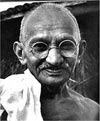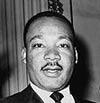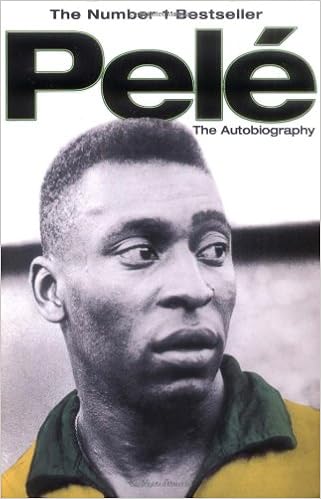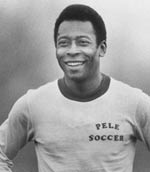
“I was born for soccer, just as Beethoven was born for music.” – Pele
Early life
Pele was born Edson Arantes do Nascimento on 23 October 1940 in Três Corações, Minas Gerais, Brazil. He was named after the American inventor Thomas Edison (his parents removed the i). In his childhood, he gained a nickname ‘Pele’ – after he mispronounced the name of a goalkeeper ‘Bile’ – Initially Pele disliked it and complained, but the more he complained, the more it stuck. Pele has no meaning and was intended as an insult, though later it was found that the word Bilé is Hebrew for “miracle.”
Pele grew up in poverty in São Paulo. He was taught to play football by his father (who used to play football), but often he had to practise with a sock stuffed with newspapers because he could not afford to buy a football. As well as playing football, he worked as a waiter in local tea shops.
In his youth, Pele played in indoor leagues, and this helped increase his speed of reactions. He rose through the youth leagues and at the age of 15 was signed by Santos FC. He was soon marked out as a future star. By the age of 16, he was the top scorer in the Brazilian league and received a call up for the Brazilian national side. Interest was such that the Brazilian President declared Pele a national treasure to prevent him being bought by foreign clubs such as Manchester United.
Pele’s World Cups
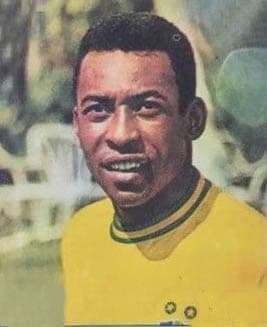
1970 World Cup

Style of play
Pele was relatively short at 5″ 8′, but he more than compensated in terms of speed, power, agility and strength. He was superb with both feet, powerful in the air, great timing and accuracy and an extraordinary perception of the game. He could mesmerise defenders with his eyes and send them the wrong way. He had a scoring ratio of 0.94 goals per game and often rose to the big occasion, scoring at crucial moments in big games. Whilst very competitive, he was also considered to be a fair player with good sense of sportsmanship. A good example was his warm embrace of Bobby Moore, the England caption after England’s defeat in the 1970 World Cup. It is sometimes held up as an embodiment of sportsmanship. Without any doubt, he is universally regarded as the greatest player of the twentieth century – if not all time. He is one of the few sportsman like Muhammad Ali and Usain Bolt, who transcend their sport to become a global icon. French footballer Michel Platini said of Pele.
“There’s Pelé the man, and then Pelé the player. And to play like Pelé is to play like God.
Career
P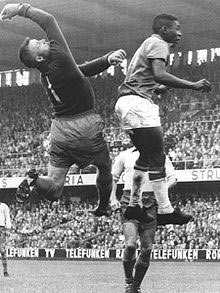
In the domestic league, Pele made his debut for Santos aged just 16. He played for Santos in the Brazilian league from until the 1972-73 season.
Pele finished his career in the lucrative US league. In 1975, he signed for New York Cosmos and played three seasons. He led the New York Cosmos to the US title in 1977 – the year of his retirement.
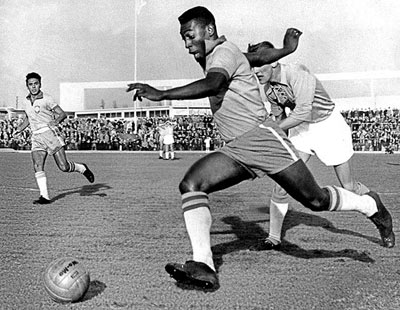
Personal life
Pele was married three times and had several children, some out of wedlock. In 1970, he was investigated by the authoritarian Brazilian government for suspected sympathy to left-wing political prisoners. Pele was investigated for handing out leaflets calling for the release of political prisoners. After the investigation, he did not get involved in politics again.
After retiring has gone on to be a great ambassador for football and sport in general. In 1992, Pelé was appointed a UN ambassador for ecology and the environment. He was also appointed a UNESCO goodwill ambassador. He is not only one of the most gifted footballers of his generation, but, also a mild-mannered man who used his fame and prestige for a positive effect.
Citation: Pettinger, Tejvan. “Biography of Pele”, Oxford, UK. www.biographyonline.net. Last updated 8 March 2020. Originally published 18 April 2010.
Some Highlights of Pele’s Career
- Athlete of the Century, by Reuters News Agency: 1999
- Athlete of the Century, elected by International Olympic Committee: 1999
- UNICEF Football Player of the Century: 1999
- TIME One of the 100 Most Important People of the 20th Century: 1999
- FIFA Player of the Century: 2000
Pele
Pele – autobiography at Amazon
Related pages
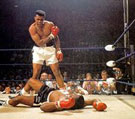 Famous Sports people – Famous sportsmen/women. Including football, athletics, tennis, rugby, cricket, boxing. A list of 100 sports stars, such as Muhammad Ali, Serena Williams, Pele and Usain Bolt.
Famous Sports people – Famous sportsmen/women. Including football, athletics, tennis, rugby, cricket, boxing. A list of 100 sports stars, such as Muhammad Ali, Serena Williams, Pele and Usain Bolt.
